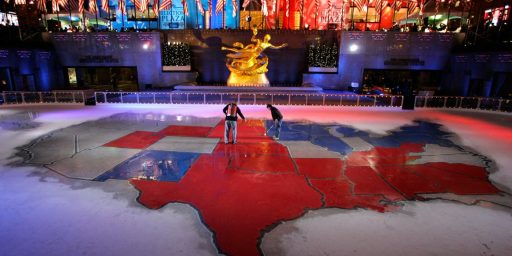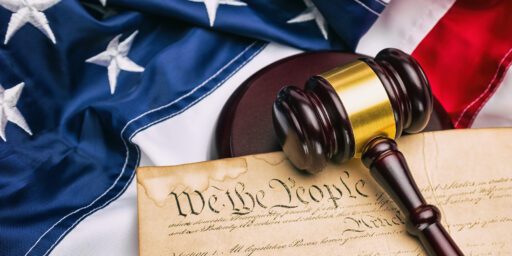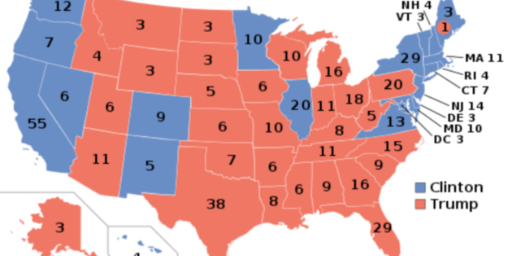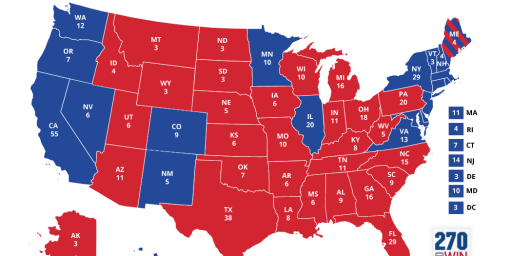Good News on the EC Front
GOP leaders in key states signal no EC shenanigans.

There has been an ongoing fear that the Trump team would seek to influence key states to seat Republican electors in states that Biden won. This was the central thesis of an Atlantic piece that got a lot of circulation (and a Fresh Air discussion), and even was mentioned in a NYT piece this week as something Trump himself had asked his advisors.
As disconcerting as this possibility seems, I have never been especially concerned it would come to pass, although I have never gotten around to writing about it.
Now some good news from some of the relevant states via the AP: GOP leaders in 4 states quash dubious Trump bid on electors.
State GOP lawmakers in Arizona, Michigan, Pennsylvania and Wisconsin have all said they would not intervene in the selection of electors, who ultimately cast the votes that secure a candidate’s victory. Such a move would violate state law and a vote of the people, several noted.
“I do not see, short of finding some type of fraud — which I haven’t heard of anything — I don’t see us in any serious way addressing a change in electors,” said Rusty Bowers, Arizona’s Republican House speaker, who says he’s been inundated with emails pleading for the legislature to intervene. “They are mandated by statute to choose according to the vote of the people.”
This is, of course, the right answer to the question, and is Speaker Bowers doing his job as opposed to most GOP members of the federal legislature, or some governors.
For example:
it has been promoted by Trump allies, including Florida Gov. Ron DeSantis, and is an example of misleading information and false claims fueling skepticism among Trump supporters about the integrity of the vote.
[…]
Asked this week if state lawmakers should invalidate the official results, GOP Sen. Lindsey Graham said, “Everything should be on the table.”
DeSantis urged Pennsylvania and Michigan residents to call state lawmakers and urge them to intervene. “Under Article 2 of the Constitution, presidential electors are done by the legislatures and the schemes they create and the framework. And if there’s departure from that, if they’re not following the law, if they’re ignoring law, then they can provide remedies as well,” he said.
That is, quite simply, gross and anti-democratic. There is no credible evidence of fraud or even irregularities in these states. I am not even sure there is anything that rises to the level of being called fake or false evidence (that is, the accusations have mostly been things that aren’t even evidence-like).
And here are dispatches from other relevant states:
Republican lawmakers, however, appear to be holding steady. “The Pennsylvania General Assembly does not have and will not have a hand in choosing the state’s presidential electors or in deciding the outcome of the presidential election,” top Republican legislative leaders, state Sen. Jake Corman and Rep. Kerry Benninghoff, wrote in an October op-ed. Their offices said Friday they stand by the statement.
The Republican leader of Wisconsin’s Assembly, Robin Vos, has long dismissed the idea, and his spokesperson, Kit Beyer, said he stood by that position on Thursday.
In Michigan, legislative leaders say any intervention would be against state law. Even though the GOP-controlled legislature is investigating the election, state Senate Majority Leader Mike Shirkey told radio station WJR on Friday, “It is not the expectation that our analysis will result in any change in the outcome.”
The AP piece outlines the context:
The theory is rooted in the fact that the U.S. Constitution grants state legislatures the power to decide how electors are chosen. Each state already has passed laws that delegate this power to voters and appoint electors for whichever candidate wins the state on Election Day. The only opportunity for a state legislature to then get involved with electors is a provision in federal law allowing it if the actual election “fails.”
If the result of the election was unclear in mid-December, at the deadline for naming electors, Republican-controlled legislatures in those states could declare that Trump won and appoint electors supporting him. Or so the theory goes.
The problem, legal experts note, is that the result of the election is not in any way unclear. Biden won all the states at issue. It’s hard to argue the election “failed” when Trump’s own Department of Homeland Security reported it was not tampered with and was “the most secure in American history.” There has been no finding of widespread fraud or problems in the vote count, which shows Biden leading Trump by more than 5 million votes nationally.
Still, I will be happier once popular vote totals are certified and the electoral votes cast. I will be even happier a few minutes after noon on January 20th.






I’d think that the fact that Trump went golfing (again) today would tell the Million MAGA marchers gathered in D.C. something. They’re there to protest an election he knows he’s lost.
@CSK: I’d think the last 4 years of trump spending one out of every 5 days at one of his golf courses would tell them something too, but they ain’t listening.
Republicans in state legislatures have certainly given us reason to think they’re less than fully committed to representative democracy. But this would be so blatant that I can’t imagine they’d take the risk, especially since by definition they’re in states that voted for a Democrat for President. Additionally, there’s next to zero chance the courts would allow changing the manner of selection after the fact.
@OzarkHillbilly:
I think–no, I know–they’d say he deserves to spend 20% of his time golfing because he works so hard on their behalf.
Since the election, he’s golfed 3 days, hasn’t he? If he plays tomorrow, that’s 4 times in 12 days, or one-third of his time.
@James Joyner: Indeed, I think that any attempt to attempt accepting alternate electors would not withstand a court challenge.
I also honestly think it would result in mass protests in the streets.
What Dr. Joyner said. These GOP legislators haven’t suddenly discovered a commitment to small d democracy, they’ve made a realistic assessment of the odds. Alito signaled a willingness to go along with something like this, but I doubt even he would throw away whatever credibility The Supremes have for a lost cause.
To pull this off, they’d have had to start in earnest a couple years ago. Now, a week and a half after the election, it’s just Trump shouting, “Will no one rid me of this meddlesome priest?” to no one in particular while he’s on his way out the door to play golf.
It’s an unfortunate sign of our times that “Legislators say they’ll follow the law” is considered “good news”.
Mea Culpa! I raised the issue of that Atlantic article several times here in the peanut gallery and having gotten closer to the magic dates for certification, it looks like this was too high a bar for the current administration to arrange. It was certainly not ruled out for ethical considerations!
The knowledge of such a scheme in someone’s mind did make me look at my ballot this year a little closer. In previous presidential elections the names of the electors were listed on the actual ballot. It was obvious that your vote was for a slate of people who had sworn to represent your vote by casting theirs for your candidate. (I blame the EC for the contortions of that sentence!)
This year, no names listed. Understanding that this is a state issue (and it’s Florida….) I’m not asking for someone to explain this. But it seems like that would be a good idea for future presidential elections.
@JohnMcC: IIRC, here in Colorado we had 22 or 23 candidates for President on the ballot. Their named electors are part of the public documents they filed to get there. Adding the nine elector names for each candidate to the actual ballot seems like overkill. As well as making the already lengthy ballot even worse.
@Mu Yixiao: Ain’t that the damn truth.
@JohnMcC:
FWIW, I have voted in three states for president since 1988 (CA, TX, and AL) and I don’t think any of them listed the electors.
I started worrying a lot less when it became clear that it would take legislative reversals in three states to change the outcome. That’s a stretch. Which one of you will go first, risk the wrath of the voters, just to see the others back down?
Because there would be blowback.
@Steven L. Taylor: ” also honestly think it would result in mass protests in the streets.”
I think “protests” is a rather genteel version of what would be happening in the streets…
“The only opportunity for a state legislature to then get involved with electors is a provision in federal law allowing it if the actual election “fails.””
Well, obviously the legal scheme of popular election failed in all these states where Biden won. The law was rigged so that only Rs would win, and there was a clear failure of that to happen, so of course the state lege has the duty to sub in some alternate means of expressing the popular will that Trump get a second term. This is all obvious. Anyone who has been to the Liberty U law school can explain it all to you.